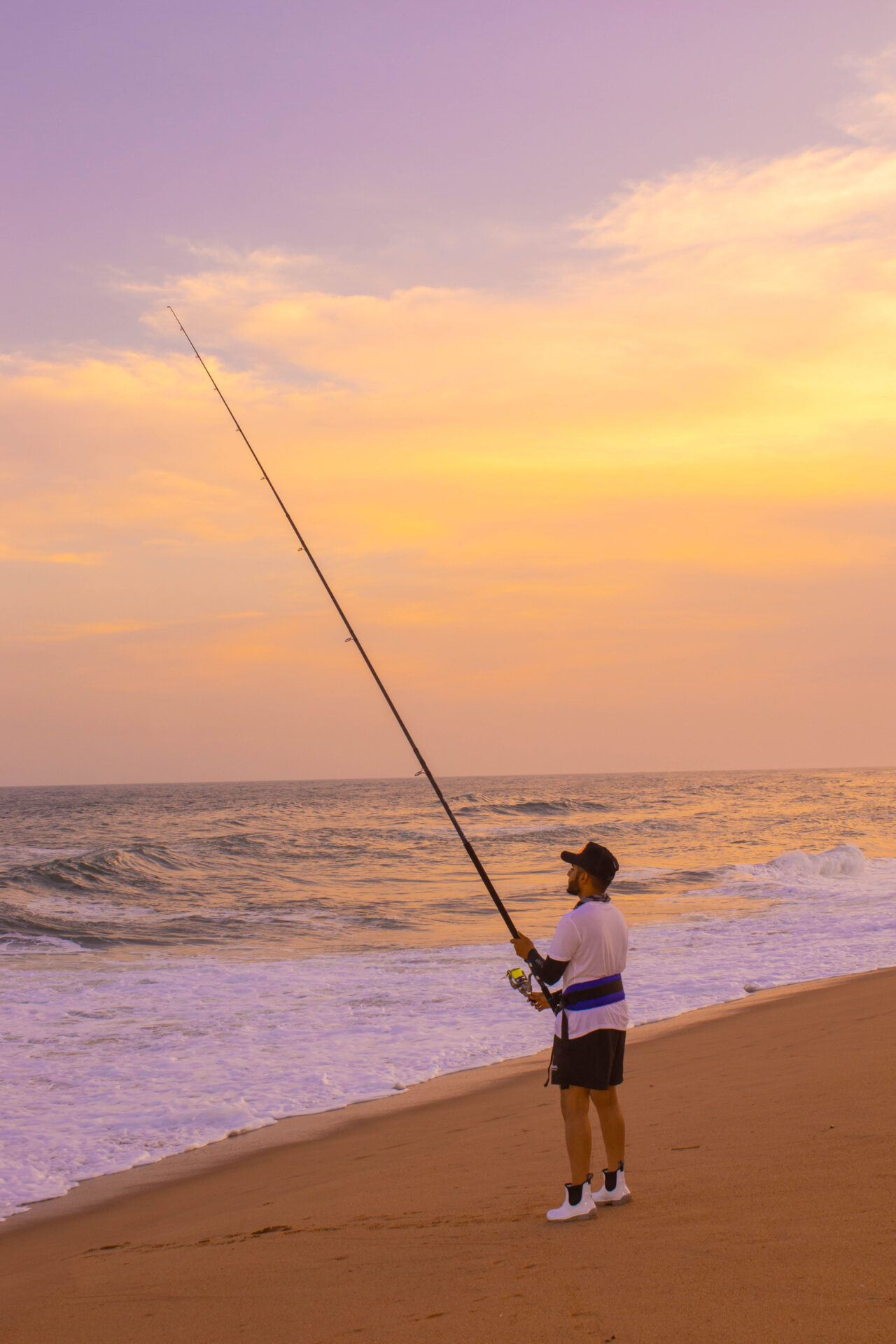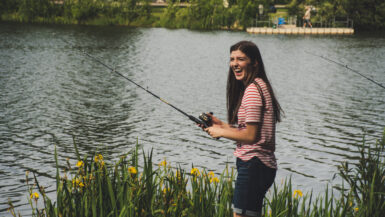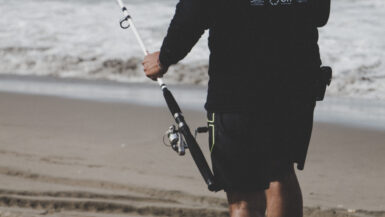Fly fishing and baitcasting are two popular methods of freshwater fishing. Both offer unique advantages and disadvantages, and it can be difficult to choose which is best for a particular body of water or fishing situation. In this article, we will compare the two and provide insight for anglers who want to make an educated decision about which is best for them. We will cover the basics of each technique, analyze their benefits and drawbacks, and provide tips for beginners. By the end, anglers should have a better idea of which method will work best for their needs.
Tackle Differences
Fly fishing is a great way to enjoy freshwater fishing and has several advantages over baitcasting. One of the most important advantages is the ability to easily and precisely cast your line.Fly fishing is considered a very accurate way of casting and can help to catch more fish. The rigs used for flyfishing also hold more hooks and lures, ensuring a greater success rate. Fly anglers also have an advantage when fishing in shallow water, as the line won’t drag along the bottom, potentially spooking the fish.
The Advantages of Baitcasting
Baitcasting is also a great way to enjoy freshwater fishing, and has its own advantages over fly fishing. Baitcasting is much easier to use than fly fishing, and can be done by anyone who has basic knowledge of casting. The rigs used in baitcasting allow you to use much heavier lures, and are much more durable than those used for fly fishing. This makes it easier to fish in deeper waters and with larger fish. The larger line used in baitcasting also allows you to cast further, making it possible to reach more spots.
Tackle Selection
No matter which technique you choose to use, the right tackle selection is essential for success. Fly fishing requires lighter rigs and lines, while baitcasting requires heavier rigs and lines. The type of rod and reels used will also vary depending on the technique. Fly rods are usually shorter and more flexible, while baitcasting rods are usually longer and more stiff. It is important to select the correct tackle for the job, as the wrong tackle can lead to fewer catches and potentially even damage to the fish.
Finding the Perfect Technique for You
While fly fishing and baitcasting both have their advantages, it is important to find the technique that is best suited for you. If you are a beginner, baitcasting might be the better option as it is easier to learn. If you are looking for a more accurate and delicate approach, fly fishing might be the right choice. It is also important to take the type of fish you are after into consideration. Knowing what kind of tackle works best for the fish you want to catch will help you decide the best technique to use.
Technique Differences
When comparing fly fishing vs. baitcasting, the skill level required to successfully use each technique must also be considered. Fly fishing is often considered to be a more challenging technique, and it takes a lot of practice and skill to become proficient. On the other hand, baitcasting is a bit easier to master and can be learned relatively quickly by most people.
Variety of Fish Caught
When it comes to fly fishing vs. baitcasting, the variety of fish that can be caught when using each technique also differs. Fly fishing is usually considered to be best for catching small or medium-sized freshwater fish, such as trout and bass. On the other hand, baitcasting can be effective for catching larger, saltwater fish, such as marlin and sailfish.
Efficiency and Speed of Catching Fish
When comparing fly fishing vs. baitcasting, the efficiency and speed of catching fish with each technique must also be considered. Fly fishing is a slower technique, and it can often take longer to catch a fish. Baitcasting, on the other hand, is a faster technique, and it is possible to catch multiple fish in a shorter amount of time.
Bait Types Used
Lastly, the type of bait used also differs when comparing fly fishing vs. baitcasting. Fly fishing typically uses artificial lures, while baitcasting can use both natural and artificial bait. Artificial lures may be more effective when fly fishing, as they are able to more accurately imitate the movements of small fish.
Overall, there are many important differences between fly fishing and baitcasting. When deciding which technique is best for freshwater fishing, it is important to consider the skill level required, the variety of fish that can be caught, the efficiency and speed of catching fish, and the types of bait that can be used.
Pros and Cons
Fly fishing and baitcasting are two popular forms of fishing that have a lot of similarities, but also a few key differences. Both types of fishing involve casting a line in order to catch fish. However, baitcasting relies on the use of a bait, such as minnows or worms, that attracts and entices fish. Fly fishing, on the other hand, involves the use of artificial fly lures that imitate the movements of insects, which are a natural food source for many fish species. This is the main difference between the two techniques.
Advantages of Fly Fishing
Fly fishing is often the preferred method for freshwater fishing. This is because it is a lot more subtle than baitcasting and can be very effective in catching fish that are spookier or more difficult to catch. Flies can also be used to target a wider variety of fish species as they often imitate various types of insect prey. Furthermore, fly fishing requires a lot less equipment and is generally easier to set up and use than baitcasting.
Benefits of Baitcasting
Baitcasting can be an effective technique for freshwater fishing, especially when targeting bigger fish. The use of bait can help attract more fish and the heavy weights used with baitcasting can help snag bigger, more powerful fish. Baitcasting is often more effective when fishing in murky or stained waters, as it can help attract fish that are harder to see. It can also be a great technique for fishing in deeper waters.
Pros and Cons of Fly Fishing vs. Baitcasting
When it comes to freshwater fishing, there are both advantages and disadvantages to both fly fishing and baitcasting. Fly fishing is often preferred for its subtlety and the ability to target a wider variety of fish species. However, it can be more challenging to learn and requires more specialized equipment. Baitcasting is great for targeting bigger fish and is often more effective in murky or deeper waters. But it also requires more equipment and can be more difficult to set up. Ultimately, it comes down to personal preference and the type of fish that are being targeted.
Application to Freshwater Fishing
Freshwater fishing is one of the most popular outdoor activities around the world, and is enjoyed by anglers of all ages and skill levels. It is a great way to relax, enjoy nature, and have a thrilling experience. To get the most out of a freshwater fishing experience, it’s important to understand the different types of fish that can be found in freshwater environments, and the different techniques used to catch them.
Fly Fishing for Freshwater Species
Fly fishing is one of the best known forms of freshwater fishing, and is well suited for anglers looking for a peaceful and fulfilling fishing experience. Fly fishing uses specialized lures and rods, and often a larger concentration of skill is needed than other methods of fishing. Depending on the type of fish you’re trying to catch, some aspects of fly fishing can be more difficult than others.
Baitcasting for Freshwater Species
Baitcasting is another popular freshwater fishing technique and requires a different set up than Fly fishing. Baitcasting uses bait, or a lure, and the bait is placed into the water using a baitcasting reel and rod. Baitcasting is often thought of as more of a beginner’s type of fishing, as it requires less skill and knowledge than fly fishing.
Advantages of Fly Fishing vs. Baitcasting
When it comes to freshwater fishing, both fly fishing and baitcasting have their advantages. Fly fishing is often the go-to for many anglers looking for a peaceful fishing experience, as it does not require the same level of skill or knowledge as baitcasting. The lures used in fly fishing also attract a larger variety of fish, making it ideal for anglers looking to target a wider range of species.
Baitcasting is also a great way to target freshwater species, as it is often easier to learn and use than fly fishing. Baitcasting is best for anglers looking for a more action-packed experience, as it is easier to catch larger fish, and the fight can be quite thrilling.
Conclusion
Ultimately, the choice between fly fishing and baitcasting comes down to personal preference and the style of fishing you are looking for. Both techniques are well suited for freshwater fishing, and whichever you decide to use will be a great way to enjoy your time outdoors.
The Decision is Up to the Fisherman
When it comes to Fly Fishing vs. Baitcasting, the decision is ultimately up to the fisherman. Both of these methods are great for freshwater fishing and can catch a wide variety of fish. Fly fishing provides a challenge and a lot of fun, while baitcasting allows for a more consistent and reliable approach. Ultimately, the decision of which method is best comes down to the fisherman’s own fishing style, preferences, and goals.





Leave a reply